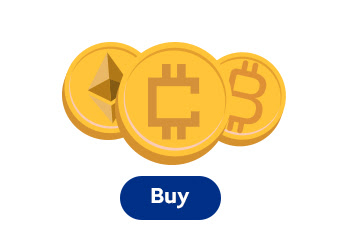You wonder who is bidding up the price of Bitcoin, and then you realize it isn't the "whale" buying $5M of coin, but lots of little people paying $10 for a "taste" of the action.
In the mail this morning (and yesterday morning and the day before) was this missive from your pals at PayPal:
| |||||||||||||||||
| |||||||||||||||||
 | |||||||||||||||||
| |||||||||||||||||
| |||||||||||||||||
| |||||||||||||||||
|
You see the pitch here - you can get in on this crypto gig for only ten bucks! Even the most serious slacker in our society can scrounge up that much - or put it on a credit card! And with one click, you can be buying and selling Bitcoin. OK, just buying, right?
PayPal is clearly struggling here. While it was a quick and easy way to pay online in the early days, today it is just as easy to use your credit card information, which Amazon helpfully stores for you (just as PayPal does). So no doubt, PayPal is struggling with decreased revenues, and hence the constant haranguing to open a checking account, credit card account, or crypto trading account with them - they have to expand beyond being an add-on to eBay.
I had written before about PayPal's struggles over the years - and their lack of moral compass. A lot of people made a lot of money from PayPal - you are not one of them. The people who started it and ran it and sold it all cashed out. The rest of us paid user fees and got a service in return, most of the time. But today - selling crypto to the plebes? Doesn't the SEC regulate this sort of thing?
Well, apparently not, so you are on your own in this Wild-West of 21st Century investing. People are pushing all sorts of sketchy things as mainstream investments - things that even hard-core experienced investors shied away from in earlier years. Commodities, such as gold, were viewed as risky - now they are sold on cheerful YouTube videos. Options? Derivatives? Stuff that only serious Wall-Street traders were involved in, and even then, with trepidation. Today, we are encouraged to sell a stock short or go long, and put it all on a credit card. What could possibly go wrong? Is $200 a share too pricey for your pocketbook? No worries, someone will sell you a fractional share - allowing the grocery clerks of America to "play the market" and drive prices to insane levels.
And now crypto - the "investment" which is based on an artificial perception of scarcity, not of anything at all, but scarcity itself. In a way it is genius, cutting to the chase with the laws of supply and demand - supply of nothing, demand of nothing,
But now maybe you see why Bitcoin is skyrocketing in price. When the guy working at Burger King can be an "investor" for $10, then all bets are off (quite literally). Again, stock prices, gold prices, Bitcoin prices, don't represent necessarily the value of a stock or whatever, but what the last sucker who bought in paid. Particularly when bubbles are involved, this is true. Much hay is made in the financial press of "Market Cap" as if multiplying the number of shares outstanding in a company by the latest stock price represents its actual value (without even subtracting debt obligations!).
The point is, what drives share prices isn't the underlying value of a company or a commodity, but what people are willing to pay, which is often based on emotional factors and skewed perceptions. And in today's markets, where "influencers" hype stocks and other investments, it isn't hard to skew perceptions. After all, we plebes can be readily manipulated by making us fear of missing out on the next big thing!
In fact, if you want to tell if something is a scam, ask yourself if the persons pushing the "investment" aren't using FOMO to get you to act - as Motley Fool routinely does. If they are using FOMO to push a sense of urgency (one of the five steps of any salesmen - instill a sense of urgency in the prospect) then chances are, it is a scam.
The plebes buying Bitcoin on PayPal aren't going to lose a lot of money. $10 here, $100 there, maybe $1000 from a Wall Street Bets "playa". And maybe a few more will spend even more. But the folks cashing out on this deal, including PayPal, will make millions - maybe Billions as Musk has done, merely by announcing he is buying Bitcoin. Nice work if you can get it.
But again, if you want to starve the 1%'ers, it begins with your pocketbook. They didn't "take away" all your money through nefarious schemes, or the Federal Reserve, you gave them your money. Whether it was a new monster truck lease, or the latest refinancing of your home to pay off credit card debts, or buying arsenals of guns and survival foods, the reason why you are poor and they are rich is that you gave them your money. Stop doing that and you will become wealthier - not by a lot, but by a little. And if everyone did that, well, the Bezos of the world would be broke - not that I expect that to happen, as the plebes, being driven by emotion, think they can buy their way to wealth, or failing that, stock-pick their way to success.
And this Bitcoin nonsense is just the latest phase of all this.
UPDATE: A reader writes with his perspective, some of which echos what I am saying here, some of which I think is a little far-fetched. My comments in italics:
It should be noted that PayPal's crypto trading scheme is nothing more than a speculative investing vehicle, and definitely not a way of buying actual cryptocurrency. You might even go as far as calling it a scam.If you look at their FAQ, they make it clear that purchased coins can't be used for making payments or transfers to third parties. PayPal also won't give you your coins' private keys, which means you can't transfer them into your private digital wallet or an independent crypto exchange. In fact, all you can do with your PayPal crypto is hold it or sell it back to PayPal. Like trading stocks, only you're not allowed to move your portfolio to a different broker or take actual possession of your holdings.
In other words, you are buying the idea of Bitcoin, not actual Bitcoin. In fairness to PayPal, this is really the same thing. When you are buying Bitcoin, you are buying an idea.
I have a computer science degree and have been following cryptocurrencies since 2013. It's a very exciting technology that may end up redefining the world of finance. If successful, it will enable us to automate a huge number of tasks, rendering the jobs of today's accountants, financiers, and lawyers obsolete. The underlying fundamental ideas are actually quite solid, though of course these days they're over-hyped.
This seems a little far-fetched, as the whole point of contract law is that it isn't automatic or executed by computers. No one in their right mind would sign a contract that would be automatically executed by a computer, without even the hope of arbitration. Note that many aspects of inheritances can be "automated" to some extent by naming beneficiaries for your IRA or putting your house in Joint Tenancy with Right of Survivorship. This does still require you to submit hard copies of the death certificate in order for the properties to "automatically" convey. They do this to prevent fraud. And yes, people do fake their deaths to collect on insurance policies.
Bitcoin's major problems are its low transaction volume capacity (approx. 5 transactions per second) and long confirmation times (10 minutes to several hours for large amounts). This makes it unsuitable for anything other than major transactions. You can use it to buy a house, for instance, or to make a big investment. But the hassle (and fees) would be too much for anything else.
This is what I said in my posting. It is not a currency anymore for small transactions. For paying ransoms and buying and selling illegal things, maybe yes. Buying a house? No, there are easier ways to transfer money in local currencies. A wire transfer is cheaper, easier, and faster to use today.
Ethereum looks promising, not so much as a means of payment, but as a smart contract platform. You can use it to code things such as loans, swaps, wills, etc. and the system will execute their terms automatically, at the right time and given the right circumstances, without human intervention and without any chance of error or fraud (provided your code is bug-free). Yes, this is already happening, and yes, it does work. Ethereum doesn't have Bitcoin's long confirmation times problem, as its transactions are typically executed within 15 seconds and are considered safe after a few minutes. It still has a volume capacity problem though, as do virtually all coins that exist today.In fact, volume capacity is the single major problem that must be solved before crypto can be widely adopted.
Again, I am skeptical that people will be willing to sign "automatic" contracts that are executed outside the legal system. But then again, who knows? But once again, we see that even with Ethereum, it is not a practical replacement for VISA/MC just yet - if ever.
Another problem, which is systemic rather than technical, is the question of governance. Right now, the vast majority of coins are regulated by their "core developers". That is, the schmucks who do the maths and the coding are also the ones who get to make decisions on what the maximum transaction fee is, or how many coins there will ever be. This, of course, is neither fair nor safe. It also causes mistrust. Ethereum, for instance, lost most of its value in the later half of 2018, after some actions of its founders caused doubt about their intentions. Some newer projects, such as Polkadot, are now trying to introduce voting systems that allow the coin's stakeholders to make such decisions instead. (Polkadot is going about it in a weird way though, using voting algorithms that aren't very democratic.)
Well, that is the real issue. You are buying a pig-in-a-poke with these things. It is like an insurance or annuity contract - all fun and games until the company that wrote the contract goes bankrupt and takes all your money, as used to happen in the past. Today, these things are regulated by governments, and in some States, insured. Can we say the same for "crypto?" And is the SEC going to dirty its hands trying to regulate it? It is the Wild West, and like banks in small mining towns, they can go bust, overnight.
Cryptocurrencies might also face another problem soon: the development of a working quantum computer. If someone manages to build one, it will immediately render many of today's cryptographic algorithms ineffective. And this will probably be the end of crypto.
I suspect it will end before that, crashing under its own weight. If it can't be used for any LEGAL purpose, what use is it? How long before "exchanges" are shut down, at least in developed countries? The SEC could argue this is an unregulated "investment" vehicle and those selling it are selling securities without a license.
For example, PayPal.







